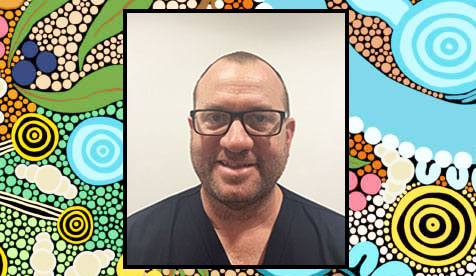

Blog

NAIDOC Week 2021 – Celebrating Indigenous Medical Practitioners – Part II
Friday July 9, 2021
Meet Dr Corey Dalton, GP Registrar, Joondalup Health Campus
Where were you born / where did you grow up? Did you identify with your culture growing up?
My mob are Arrernte from the central desert, closer to the western central desert. I was born in NSW (Carringbah) as my parents were working there at the time. We soon moved back where I spent times as a young child growing up in Darwin and Alice Springs. When my parents divorced I moved to WA with my mother, however, she always ensured that I remained connected to my culture and every summer holidays I would spend weeks on country with my uncles and cousins. It was hard growing up as a young Aboriginal boy as living in Perth in the 1980’s with overt racism in the community which forced me to live in two worlds at the time. I am so grateful to have remained culturally connected to my heritage. I didn’t realise at the time how important this would be to me later in life. Having this connection with my mob and learning my culture is something I carry on now in my life and more importantly I am passing onto my children.
Where do you see yourself practicing and (if applicable), what specialisation in the next few years?
I start working at the Derbarl Yerrigan Health Service in 2022 where I envisage myself continuing to work in the AMS. As a GP registrar I am hoping to gain further experience in ear health with a goal to offer regular health coverage not only here in the metropolitan AMS, moreover, to work in a rural setting in the north west.
What does this year’s NAIODC Week theme, #Heal Country, mean to you?
#Heal Country as a theme in NAIDOC week for 2021 offers me hope to continue the connection of our culture to the rest of Australia. A vital step is ensuring that non-indigenous people have the opportunity to connect with Aboriginal and Torres Strait Islander culture, be aware of the language groups, traditions and Indigenous peoples for the land that they are living on. I see this occurring more and more each year with non-indigenous colleges and friends seeking out to understand the culture. This is a great step towards connecting everyone and enables us in the health profession to work together closing the gaps in health outcomes.
What do you think the health profession can do to help with this healing?
What I see occurring in the is a greater understanding of the traditional owners and cultural nuances that help communication barriers be removed enabling better health care. Across the health care professions it is great to see increasing numbers of Aboriginal and Torres Strait Islander professionals and with the encouragement and support from the AMA we hope to see increased Aboriginal and Torres Strait Islander Doctors in the community.
Tell us a story from your Country, that resonates with you the most.
My most vivid memories were being on country for weeks at a time learning stories from my uncles and other elders. Camping and being on county in the middle of the desert hearing the stories and being with my mob was medicine in itself. Here I learnt skills also in finding water, what food could be eaten and what we were allowed to hunt which in hindsight gave me knowledge in surviving on my own country but more importantly taught me my personal connection as an Arrernte man as I grew. Being with my cousins and family on country is something I hold close to my heart. Connection to country is most important and enables us to continue into the next generation.


